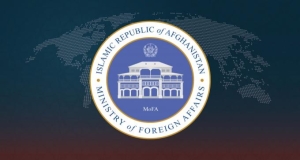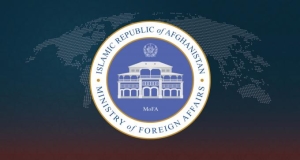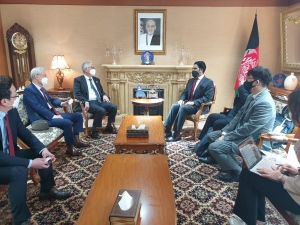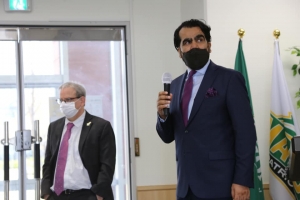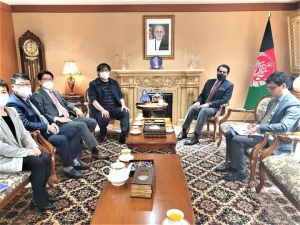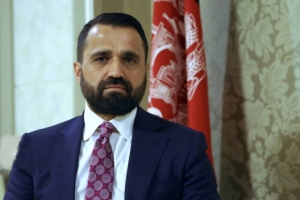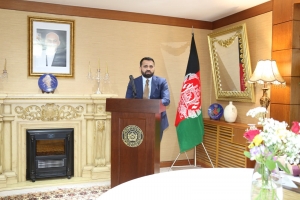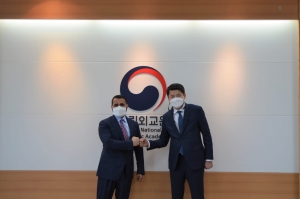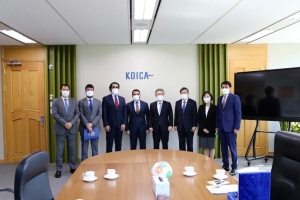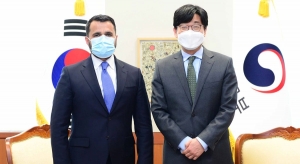Statement of the Diplomatic Missions of the Islamic Republic of Afghanistan on the Stampede in Seoul During Halloween Festivities
30 October 2022
We are deeply saddened to learn about the tragic incident during Halloween celebrations in Seoul, which resulted in the loss of life of more than 150 people and the injury of many more.
We extend our deep condolences to the people and government of the Republic of Korea over this tragedy, especially to the bereaved families.
We greatly value the long-standing close ties of friendship between the peoples of Afghanistan and the Republic of Korea, which is also reflected in the provision of important Korean support and assistance for peace, democracy, and prosperity in Afghanistan over the past several years.
Our thoughts are with the Korean people and the Government of the Republic of Korea at this difficult time and we wish a speedy recovery for the injured.
Statement of the Diplomatic Missions of the Islamic Republic of Afghanistan on the Humanitarian Situation in Afghanistan
October 28, 2021
Afghanistan is facing one of the most complex humanitarian crises of its recent history. This has stemmed from a convergence of the past four decades of imposed conflicts, endemic poverty, the adverse effects of climate change and the impact of the global economic recession due to COVID-19. More importantly, the past six months of extreme violence, failure of the state to provide effective public service, and disruption of the constitutional order have further exacerbated the grim humanitarian landscape across Afghanistan where the imminent collapse of state institutions and economy have pushed the whole Afghan nation to the brink. Consequently, according to the United Nations (UN) agencies, fourteen million Afghans (1 in 3 Afghans) face severe hunger; around three million Afghan children are at risk of acute malnutrition; 22.8 million Afghans could face acute hunger during wintertime; and 97% of all Afghans could plunge into poverty by mid-2022.
The diplomatic missions of the Islamic Republic of Afghanistan welcome the convening by UN Secretary General Antonio Guterres of a high-level ministerial conference on Afghanistan’s humanitarian situation last month. Afghans were heartened that over one hundred countries and thirty international and regional organizations participated and generously pledged $1.2 billion—including $606 million for the next four months through the end of December. However, of the latter amount, according to the UN, it has only received $300 million, which is inadequate to address the urgent needs of Afghanistan’s vulnerable groups across the country. Hence, we strongly support the call by Secretary-General Guterres on the international community to expedite the disbursement of their generous financial aid pledges to help avert worst-case scenarios if lifesaving aid fails to reach those in acute need.
Moreover, we underscore with gratitude the provision by the European Union (EU) of $1.2 billion in pledged support for the humanitarian programs in and out of Afghanistan with a focus on the Afghan internally displaced persons, refugees in neighboring countries, as well as asylum seekers.
Knowing from the past experience, we urge that the implementing agencies of the UN, NGOs, and other humanitarian actors take maximum aid effectiveness measures to ensure that assistance is delivered to the most vulnerable people and on the basis of needs alone. This collective effort should help reach more Afghan beneficiaries for assistance and thus save more lives this winter.
The diplomatic missions of the Islamic Republic of Afghanistan around the world will offer its full support and assistance to the international assistance community and humanitarian actors to accomplish this extremely important life-saving mission.
We also call on the Taliban to ensure full respect for human rights, international humanitarian law and principles so that the humanitarian aid community can reach out to all our people in need.
***
Afghan vice foreign minister hopes to expand ties
By Kwon Mee-yoo
As the Islamic Republic of Afghanistan pursues a path toward peace and stability after a long conflict with the Taliban, Korea played an important role in the country's reconstruction. Now, the two countries seek further cooperation in trade and commercial ties, according to the country's ranking official.
Meerwais Nab, deputy foreign minister for political affairs of Afghanistan, visited Korea from April 6 to 9 for the first-ever political consultation between the two countries.
"We had a constructive and productive discussion with Lee (Kyung-chul, Korea's special representative for Afghanistan and Pakistan), and meantime exchanged conversation with second vice foreign minister Choi Jong-moon. I expressed gratitude on the meaningful contribution of the Republic of Korea to the reconstruction process of Afghanistan in the last 20 years, specifically on the social development and capacity-building," Nab said at an interview with The Korea Times at a hotel in Seoul, April 8.
"We also talked of how we can work together in various areas including expanding cooperation in the United Nations and other international organizations."
Nab emphasized how Korea contributed to Afghanistan's efforts in the post-Taliban rebuilding of the country.
"South Korea mainly funded and invested in Afghanistan according to the priority of the Afghan government. I think this is the main reason of the tangible result we have from South Korea's assistance," Nab said.
"South Korea built a very effective vocational training center in Afghanistan that has already trained more than 7,000 Afghans in different fields. We have other programs on capacity-building such as afforestation, agriculture and healthcare. More importantly, we are working to see how we can adjust the next phase of our relations and how we can increase trade and commercial ties."
Despite the long distance between the two countries, Nab sees much potential in economic cooperation.
"Afghanistan is a country with a 35 million population, a perfect market for South Korean products. In the meantime, Afghanistan is rich with resources, which can be another area of cooperation, attracting South Korean investment. For example, Afghanistan has one of the world's largest lithium mines and is rich in precious stones," he said.
"We have a number of Afghan businesses already in South Korea, mostly exporting South Korean goods not just to Afghanistan but to other countries in the Middle East. Though there are security problems to attract direct investment of South Korean businesses in Afghanistan … we do have high-quality goods in Afghanistan such as dried and fresh fruit, saffron and carpet and South Korea has the market for Afghan goods."
"South Korea is also well-known for its Constitution and other laws and regulations. South Korea is one of the top countries with the implementation of those regulations. So I think there is another area of cooperation on the judiciary system between the two countries," Nab said.
Hallyu, or the Korean Wave, has also reached the Central Asian country.
"Though we are living at a far distance, Korean TV dramas are famous in Afghanistan. You might think of Afghanistan as a conservative Islamic country, the attractions of those dramas are very high. It shows that there is a cultural connection between Korea and Afghanistan," the deputy foreign minister said.
"Because of the war, in the last 42 years in Afghanistan, we were not able to explore other areas of potential cooperation. Now with our worlds getting closer with lots of interactions between South Korea and Afghanistan, we have the political commitment of the leadership of the countries to expand the relationship in all fields."
As Nab believes that people-to-people relationships are the foundation of bilateral relations, he hopes to introduce more culture of South Korea to Afghanistan and vice versa. The two countries are looking into various ways to introduce each other's culture such as providing scholarships to young Afghans to study in Korea and opening a Korean Culture Center in Afghanistan.
"We are far away from each other but have similarities. Though Afghanistan now represents the Islamic civilization and the 'Heart of Asia,' it was the epicenter of Buddhism thousands of years ago and a famous Korean monk (Hyecho) traveled to Afghanistan in the eighth century," he said.
"We know the history of Korea after World War II and understand and appreciate what Koreans have done for the last 40 years in terms of development and prosperity. You changed the status of Korean from a receiver to a donor. What Korea has experienced is very important for us. The historical similarity is another fuel in expanding our relationship.
"The cultural aspect of the relationship is very deep and there is a big potential to explore and expand. We are people and we will never forget our today and past. The Korean investment and engagement in Afghanistan is not because of the political or security agenda; because of the hardships you experienced, you want to share your wealth of knowledge and experience with other countries. We fully understand that and are really grateful for that."
Kwon Mee-yoo
This email address is being protected from spambots. You need JavaScript enabled to view it.

